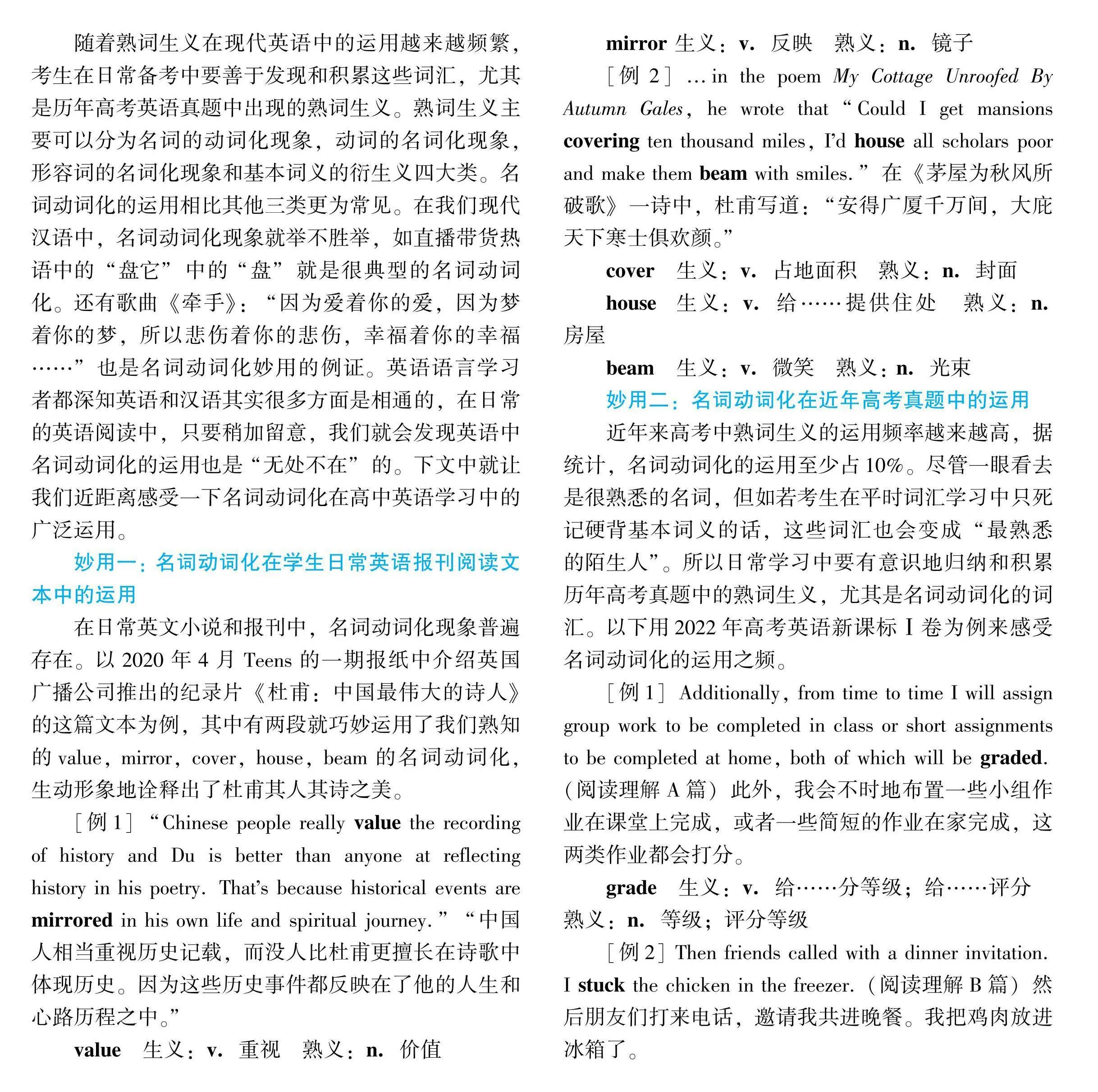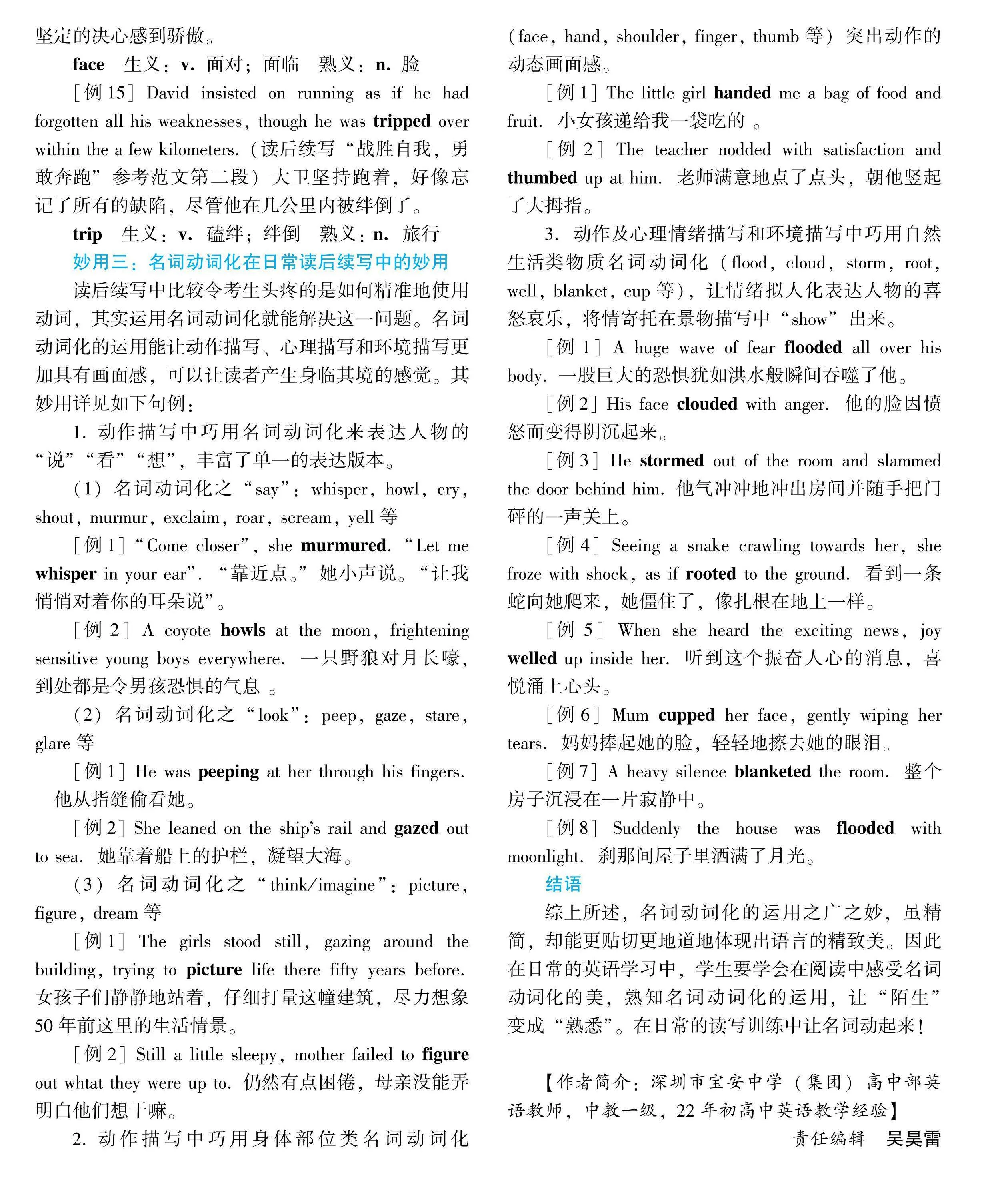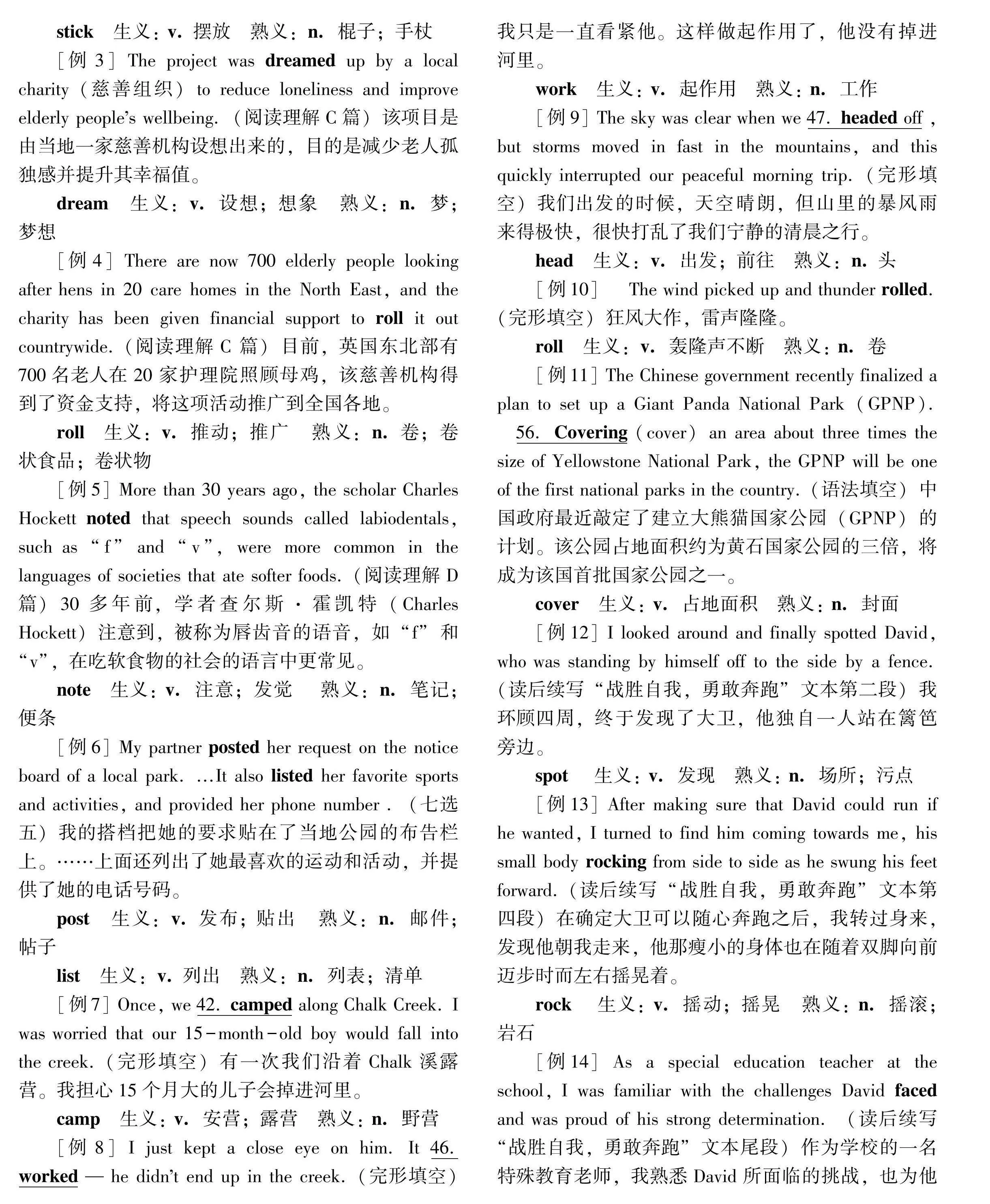高中英语名词动词化的妙用



随着熟词生义在现代英语中的运用越来越频繁,考生在日常备考中要善于发现和积累这些词汇,尤其是历年高考英语真题中出现的熟词生义。熟词生义主要可以分为名词的动词化现象,动词的名词化现象,形容词的名词化现象和基本词义的衍生义四大类。名词动词化的运用相比其他三类更为常见。在我们现代汉语中,名词动词化现象就举不胜举,如直播带货热语中的“盘它”中的 “盘”就是很典型的名词动词化。还有歌曲《牵手》:“因为爱着你的爱,因为梦着你的梦,所以悲伤着你的悲伤,幸福着你的幸福……”也是名词动词化妙用的例证。英语语言学习者都深知英语和汉语其实很多方面是相通的,在日常的英语阅读中,只要稍加留意,我们就会发现英语中名词动词化的运用也是 “无处不在”的。下文中就让我们近距离感受一下名词动词化在高中英语学习中的广泛运用。
妙用一: 名词动词化在学生日常英语报刊阅读文本中的运用
在日常英文小说和报刊中,名词动词化现象普遍存在。以2020年4月Teens的一期报纸中介绍英国广播公司推出的纪录片《杜甫:中国最伟大的诗人》的这篇文本为例,其中有两段就巧妙运用了我们熟知的value, mirror, cover, house, beam的名词动词化,生动形象地诠释出了杜甫其人其诗之美。
[例1]“Chinese people really value the recording of history and Du is better than anyone at reflecting history in his poetry. Thats because historical events are mirrored in his own life and spiritual journey.”“中国人相当重视历史记载,而没人比杜甫更擅长在诗歌中体现历史。因为这些历史事件都反映在了他的人生和心路历程之中。”
value 生义:v.重视 熟义:n.价值
mirror 生义:v.反映 熟义:n.镜子
[例2] …in the poem My Cottage Unroofed By Autumn Gales, he wrote that “Could I get mansions covering ten thousand miles, Id house all scholars poor and make them beam with smiles.”在《茅屋为秋风所破歌》一诗中,杜甫写道:“安得广厦千万间,大庇天下寒士俱欢颜。”
cover 生义:v.占地面积 熟义:n.封面
house生义:v.给……提供住处 熟义:n.房屋
beam生义:v.微笑 熟义: n.光束
妙用二:名词动词化在近年高考真题中的运用
近年来高考中熟词生义的运用频率越来越高,据统计,名词动词化的运用至少占10%。尽管一眼看去是很熟悉的名词,但如若考生在平时词汇学习中只死记硬背基本词义的话,这些词汇也会变成“最熟悉的陌生人”。所以日常学习中要有意识地归纳和积累历年高考真题中的熟词生义,尤其是名词动词化的词汇。以下用2022年高考英语新课标Ⅰ卷为例来感受名词动词化的运用之频。
[例1]Additionally, from time to time I will assign group work to be completed in class or short assignments to be completed at home, both of which will be graded. (阅读理解A篇)此外,我会不时地布置一些小组作业在课堂上完成,或者一些简短的作业在家完成,这两类作业都会打分。
grade 生义:v.给……分等级;给……评分 熟义:n.等级;评分等级
[例2] Then friends called with a dinner invitation. I stuck the chicken in the freezer. (阅读理解B篇)然后朋友们打来电话,邀请我共进晚餐。我把鸡肉放进冰箱了。
stick 生义: v. 摆放 熟义:n.棍子;手杖
[例3] The project was dreamed up by a local charity(慈善组织)to reduce loneliness and improve elderly peoples wellbeing.(阅读理解C篇)该项目是由当地一家慈善机构设想出来的,目的是减少老人孤独感并提升其幸福值。
dream 生义:v.设想;想象 熟义:n.梦;梦想
[例4] There are now 700 elderly people looking after hens in 20 care homes in the North East, and the charity has been given financial support to roll it out countrywide. (阅读理解C 篇)目前,英国东北部有700名老人在20家护理院照顾母鸡,该慈善机构得到了资金支持,将这项活动推广到全国各地。
roll 生义:v.推动;推广 熟义:n. 卷;卷状食品;卷状物
[例5] More than 30 years ago, the scholar Charles Hockett noted that speech sounds called labiodentals, such as “f” and “v”, were more common in the languages of societies that ate softer foods. (阅读理解D篇)30多年前,学者查尔斯·霍凯特(Charles Hockett)注意到,被称为唇齿音的语音,如“f”和“v”,在吃软食物的社会的语言中更常见。
note 生义: v.注意;发觉 熟义:n.笔记; 便条
[例6] My partner posted her request on the notice board of a local park. …It also listed her favorite sports and activities, and provided her phone number .(七选五)我的搭档把她的要求贴在了当地公园的布告栏上。……上面还列出了她最喜欢的运动和活动,并提供了她的电话号码。
post 生义:v. 发布; 贴出 熟义:n.邮件;帖子
list 生义:v. 列出 熟义:n.列表;清单
[例7] Once, we 42. camped along Chalk Creek. I was worried that our 15-month-old boy would fall into the creek. (完形填空)有一次我们沿着Chalk溪露营。我担心15个月大的儿子会掉进河里。
camp 生义: v.安营;露营 熟义: n.野营
[例8] I just kept a close eye on him. It 46. worked — he didnt end up in the creek. (完形填空) 我只是一直看紧他。这样做起作用了,他没有掉进河里。
work 生义: v.起作用 熟义: n.工作
[例9] The sky was clear when we 47. headed off , but storms moved in fast in the mountains, and this quickly interrupted our peaceful morning trip. (完形填空)我们出发的时候,天空晴朗,但山里的暴风雨来得极快,很快打乱了我们宁静的清晨之行。
head 生义:v.出发;前往 熟义:n. 头
[例10] The wind picked up and thunder rolled. (完形填空)狂风大作,雷声隆隆。
roll 生义:v.轰隆声不断 熟义: n.卷
[例11] The Chinese government recently finalized a plan to set up a Giant Panda National Park(GPNP). 56.Covering (cover)an area about three times
the size of Yellowstone National Park, the GPNP will be one of the first national parks in the country. (语法填空)中国政府最近敲定了建立大熊猫国家公园(GPNP)的计划。该公园占地面积约为黄石国家公园的三倍,将成为该国首批国家公园之一。
cover 生义: v.占地面积 熟义: n.封面
[例12] I looked around and finally spotted David, who was standing by himself off to the side by a fence. (读后续写“战胜自我,勇敢奔跑”文本第二段)我环顾四周,终于发现了大卫,他独自一人站在篱笆旁边。
spot 生义: v.发现 熟义: n.场所;污点
[例13] After making sure that David could run if he wanted, I turned to find him coming towards me, his small body rocking from side to side as he swung his feet forward. (读后续写“战胜自我,勇敢奔跑”文本第四段)在确定大卫可以随心奔跑之后,我转过身来,发现他朝我走来,他那瘦小的身体也在随着双脚向前迈步时而左右摇晃着。
rock 生义: v.摇动;摇晃 熟义: n.摇滚;岩石
[例14] As a special education teacher at the school, I was familiar with the challenges David faced and was proud of his strong determination.(读后续写“战胜自我,勇敢奔跑”文本尾段)作为学校的一名特殊教育老师,我熟悉David所面临的挑战,也为他坚定的决心感到骄傲。
face 生义:v. 面对;面临 熟义:n. 脸
[例15] David insisted on running as if he had forgotten all his weaknesses, though he was tripped over within the a few kilometers. (读后续写“战胜自我,勇敢奔跑”参考范文第二段)大卫坚持跑着,好像忘记了所有的缺陷,尽管他在几公里内被绊倒了。
trip 生义:v.磕绊;绊倒 熟义: n.旅行
妙用三:名词动词化在日常读后续写中的妙用
读后续写中比较令考生头疼的是如何精准地使用动词,其实运用名词动词化就能解决这一问题。名词动词化的运用能让动作描写、心理描写和环境描写更加具有画面感,可以让读者产生身临其境的感觉。其妙用详见如下句例:
1. 动作描写中巧用名词动词化来表达人物的“说”“看”“想”,丰富了单一的表达版本。
(1)名词动词化之“say”:whisper, howl, cry, shout, murmur, exclaim, roar, scream, yell等
[例1] “Come closer”, she murmured. “Let me whisper in your ear”.“靠近点。”她小声说。“让我悄悄对着你的耳朵说”。
[例2] A coyote howls at the moon, frightening sensitive young boys everywhere.一只野狼对月长嚎,到处都是令男孩恐惧的气息 。
(2)名词动词化之“look”:peep, gaze, stare, glare等
[例1] He was peeping at her through his fingers. 他从指缝偷看她。
[例2] She leaned on the ships rail and gazed out to sea.她靠着船上的护栏,凝望大海。
(3)名词动词化之“think/imagine”: picture, figure, dream等
[例1] The girls stood still, gazing around the building, trying to picture life there fifty years before.女孩子们静静地站着,仔细打量这幢建筑,尽力想象50年前这里的生活情景。
[例2] Still a little sleepy, mother failed to figure out whtat they were up to. 仍然有点困倦,母亲没能弄明白他们想干嘛。
2. 动作描写中巧用身体部位类名词动词化(face, hand, shoulder, finger, thumb等)突出动作的动态画面感。
[例1] The little girl handed me a bag of food and fruit.小女孩递给我一袋吃的 。
[例2] The teacher nodded with satisfaction and thumbed up at him.老师满意地点了点头,朝他竖起了大拇指。
3.动作及心理情绪描写和环境描写中巧用自然生活类物质名词动词化(flood, cloud,storm, root,well, blanket, cup等),让情绪拟人化表达人物的喜怒哀乐,将情寄托在景物描写中“show”出来。
[例1] A huge wave of fear flooded all over his body. 一股巨大的恐惧犹如洪水般瞬间吞噬了他。
[例2] His face clouded with anger.他的脸因愤怒而变得阴沉起来。
[例3] He stormed out of the room and slammed the door behind him. 他气冲冲地冲出房间并随手把门砰的一声关上。
[例4] Seeing a snake crawling towards her, she froze with shock, as if rooted to the ground.看到一条蛇向她爬来,她僵住了,像扎根在地上一样。
[例5] When she heard the exciting news, joy welled up inside her.听到这个振奋人心的消息,喜悦涌上心头。
[例6] Mum cupped her face, gently wiping her tears.妈妈捧起她的脸,轻轻地擦去她的眼泪。
[例7] A heavy silence blanketed the room.整个房子沉浸在一片寂静中。
[例8] Suddenly the house was flooded with moonlight.刹那间屋子里洒满了月光。
结语
综上所述,名词动词化的运用之广之妙,虽精简,却能更贴切更地道地体现出语言的精致美。因此在日常的英语学习中,学生要学会在阅读中感受名词动词化的美,熟知名词动词化的运用,让“陌生”变成“熟悉”。在日常的读写训练中让名词动起来!
【作者简介:深圳市宝安中学(集团)高中部英语教师,中教一级,22年初高中英语教学经验】
责任编辑 吴昊雷

